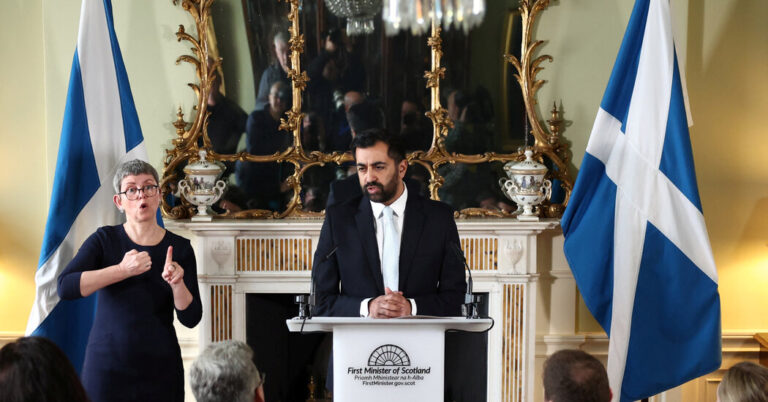Scottish First Minister Humza Yousaf abruptly ended a coalition deal between his Scottish National Party and the Scottish Green Party on Thursday, creating a new set of challenges for an embattled leader whose party is engulfed in a corruption scandal. funding since last year.
A decision by the Scottish Government to relax climate change targetsand disagreement within the coalition over trans rights policieshad increased tensions between the two parties, which have governed together since August 2021.
But Mr Yousaf’s decision to scrap the coalition appeared to surprise Lorna Slater, co-leader of the Greens, on Thursday morning. She accused the SNP of an “act of cowardice”, adding that Mr Yousaf could “no longer be trusted”.
Does this mean the end of Scottish government?
Not now. The Scottish Conservatives are pushing for a vote of no confidence in Mr Yousaf, which the opposition Scottish Labor Party has proposed. signaled that he would support, and it could happen next week. But this vote is about confidence in Mr Yousaf, not the government, so its implications would not be clear even if he were to lose. Generally speaking, the rules make it difficult to hold early elections that could force the SNP out of government in Scotland.
For now, the collapse of the coalition means Mr Yousaf leads a minority administration. But this is not the first time that the SNP has governed in a minority: it did so after the 2007 and 2016 elections. The Scottish Parliament has a more proportional electoral system that the British Parliament, as it was created with the explicit objective to represent the diverse needs of the population and to encourage compromise between political parties.
Mr Yousaf said on Thursday he hoped to continue cooperating with the Greens but in a less formal way. A day after Thursday’s split, the Greens said they would vote against Mr Yousaf in the vote of confidence.
Assuming the government survives, the SNP will be two votes short of a majority and will need to contact other political parties in the Scottish Parliament to ensure its key legislation is passed.
So where did he go?
Mr Yousaf said on Thursday the coalition deal had “achieved its objective” but the main tension between the SNP and Greens was over climate policy after the government’s decision to curb its commitments.
When Nicola Sturgeon was First Minister, the Scottish Government ambitiously committed to reducing greenhouse gas emissions by 75% by 2030, compared to 1990 levels.
But a critical report of an independent commission appointed by the government in March estimated that the objective was “is no longer credible” and last week the SNP announced it would abandon its annual targets.
After this statement, Patrick Harvie, co-leader of the Greens, said he was “angry and disappointed” but that he was in favor of maintaining the coalition because it had made significant progress on climate and other policies. However, the Scottish Greens were considering giving their members the right to vote on whether or not to remain in the coalition, and no one knew how that would happen.
Was climate policy the only disagreement?
Policy on transgender issues was also controversial, with some Greens dissatisfied with a decision by the National Health Service in Scotland. suspend the prescription of puberty blockers and other hormonal treatments for minors. This followed an independent gender services review in England by Hilary Cass, pediatrician. “Many young people will be concerned about the effect of the decision to discontinue puberty blockers on their healthcare journey” says Gillian Mackaya Green member of the Scottish Parliament, adding: “Our solidarity should be with them. »
Why now?
The coalition deal was struck when Ms Sturgeon was Scotland’s first minister and leader of the SNP, which campaigns for Scottish independence. She resigned last year, and her husband, Peter Murrell, was recently indicted with embezzlement of party funds while he was its long-time director general. Ms Sturgeon was arrested and questioned as part of the same investigation last year, but was released and no charges were brought.
The police investigation into the financing of the SNP has plunged the party into crisis. Since taking over the country, Mr Yousaf has struggled to assert his authority, and with a British general election expected later this year, opinion polls show that Britain’s main opposition party, the Labor Party, is launching a new challenge in Scotland, where it was once dominant.
For Mr Yousaf, who was already facing criticism on various issues, options were narrowing. Faced with the choice of waiting for the outcome of a vote on whether the coalition deal with the Greens survives, he decided to take the initiative. After announcing the end of the pact on Thursday, he told a news conference: “This is leadership.”
When asked by a reporter if his approach was that “it’s better to break up than to be dumped”, Mr Yousaf replied: “Personally, I wouldn’t know.”


